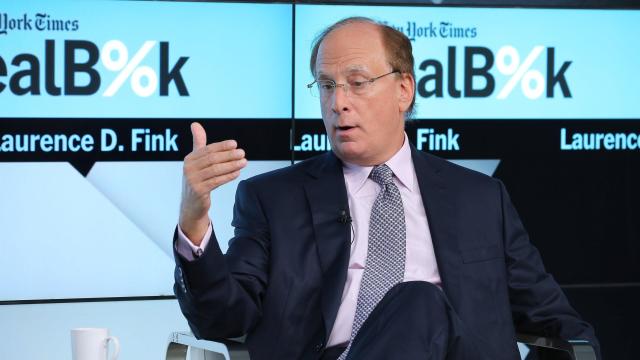Financial giant BlackRock, which has fashioned itself as a leader in a global transition to cleaner energy, seems more than willing to shrug off its climate commitments and keep investing in dirty fuels behind closed doors, according to an email released this week.
“It was also nice to hear that BlackRock didn’t mean — or no longer believes — many of the disagreeable things the company and its CEO Mr. [Larry] Fink have said about the oil and gas industry,” a climate-change-denying oil and gas regulator wrote to a company executive after a January meeting.
The email, released through a records request and first reported by The Bureau of Investigative Journalism and The Guardian, was sent by Emmy-nominated former gospel singer and climate-denier extraordinaire Wayne Christian. Christian, for those who need a refresher, is one of three commissioners who run the Texas Railroad Commission (TRC), the primary regulatory body for oil and gas in the state of Texas — and, by extension, one of the most important oil and gas regulatory bodies in the world.
Christian is not shy about expressing his climate denial: “The idea that in 12 years the sun will have gotten so hot or the seas risen so much that large swaths of earth become uninhabitable is laughable nonsense deserving of ridicule,” he told Earther in an emailed statement last year. The RRC also helped spread false talking points about wind turbines’ role in the Texas blackouts last year.
In contrast to Christian, BlackRock’s CEO, Larry Fink, has positioned himself in recent years as a leader in green energy, a sort of climate-friendly cheerleader for the financial world. Fink’s annual letters to BlackRock investors have focused on the shifts climate change will bring to the global financial system since 2020; he’s has received repeated praise from U.S. Special Envoy on Climate John Kerry, written op-eds for the New York Times, and attended the COP26 climate talks last year in Glasgow.
But according to the email, sent in January following a scheduled meeting with Christian and a team of executives from BlackRock, all of Fink’s nice words about the energy transition don’t mean much behind closed doors.
“I appreciated the opportunity to share my perspective on the serious financial issues presently facing the oil and gas industry,” Christian wrote to Dalia Blass, who is listed on BlackRock’s website as the company’s Head of External Affairs; Blass, the website states, is responsible for overseeing the company’s Sustainability initiatives. “I look forward to our continued dialogue to ensure the Texas oil and gas industry receives fair access to capital and investment.”
“We focus on climate not because we’re environmentalists, but because we are capitalists,” a BlackRock spokesperson told the Bureau. “BlackRock has been clear and consistent since January 2020 that climate risk is an investment risk that will impact returns […] Our investment conviction is that sustainability- and climate-integrated portfolios can provide better risk-adjusted returns to our clients. BlackRock has long stated that energy firms play an important role in the global economy and in a successful transition […] In both public and private engagements, including in Texas, BlackRock executives are consistent on these points.”
Christian’s seeming concern for the poor, suffering oil and gas industry isn’t out of the blue: Texas has been leading a growing number of right-wing states in battle against major financial institutions and businesses they see as inimical to dirty fuels. Last year, Texas passed a law intended to prevent companies that “boycott” fossil fuels — in reality ones that have made any sort of public pronouncements or policies to move away from oil, gas and coal — from doing business in the state. The prominent conservative network ALEC promptly borrowed the idea to draft legislation that could be replicated across multiple states. A few months after the Texas law was introduced, a coalition of 15 state treasurers, led by West Virginia State Treasurer Riley Moore, sent a letter to the White House accusing John Kerry of “bully[ing] corporations into curtailing legal activities” with regards to fossil fuels; those states followed up with a similar letter in November addressed vaguely to “the U.S. banking industry.” In January, Riley announced that West Virginia wouldn’t use funds from BlackRock any longer, thanks to the company’s statements on climate.
As the Bureau reports, some banks may have already caved to the pressure. US Bank, the fifth largest banking institution in the country, responded “positively” to the 15 states’ letter, the Bureau reported, promising to change a policy of not investing in coal-fired power plants. (“Personally, I totally agree with the [treasurers’] letter,” a senior vice president at the bank added in a note.)
